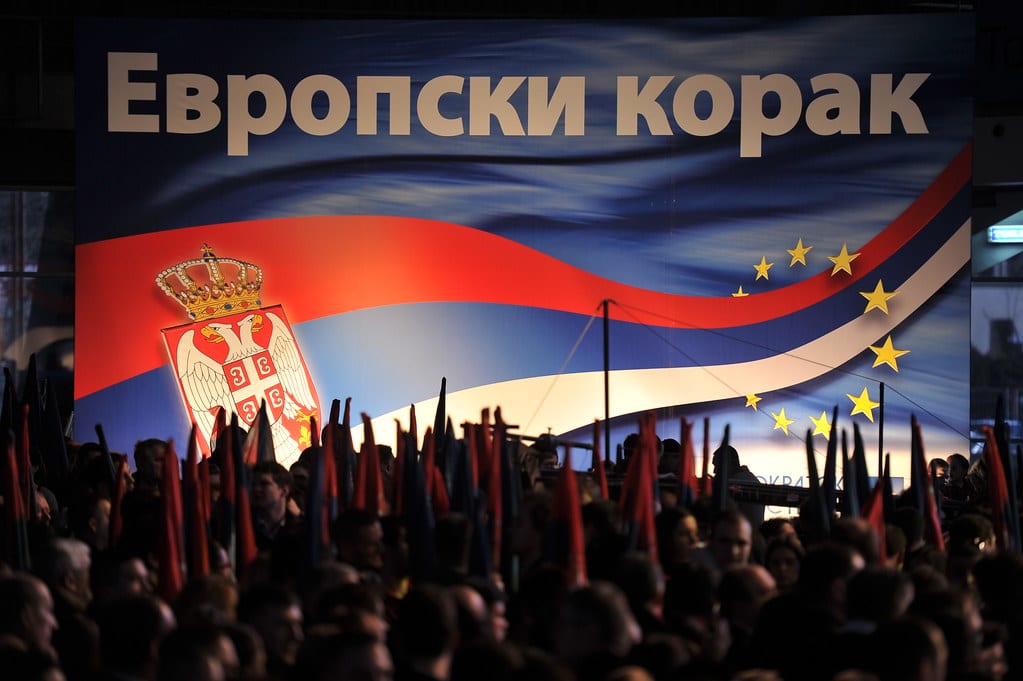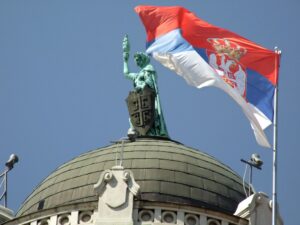Following the government’s request to access bank records of non-governmental organizations and individuals, pressure on the freedom of speech and media in Serbia has taken a new form. Namely, the Finance Ministry’s Money Laundering Prevention Department wants to determine whether the listed media employees and NGOs are connected to money laundering or operations to finance terrorism. The list includes the names of civil society organizations openly critical of the government.
Tanja Fajon, chairwoman of the EP Delegation to Serbia, wrote on Twitter: “Most CSOs, the media and individuals under investigation by the government for money laundering are among the main advocates of pro-European reforms and values in Serbia.”
Mapping EU’s reactions
Serbia, together with Montenegro, has been scaled down from democracy to a hybrid regime in the Nations in Transition 2020 report by Freedom House. What does that tell us about the EU accession negotiations and influence on the state of democracy in candidate countries?
Behind the expected “bureaucratic” vocabulary, the latest European Commission’s working document on chapters 23 and 24, the so-called non-paper, clearly highlights problems in the field of democracy. Among other things, it lists political polarization, politically influenced judiciary, insufficient oversight of the executive power, lack of progress in improving electoral conditions, corruption as a significant problem in several areas, as well as threatening decrease in freedom of speech and media. Additionally, the progress Serbia did make was considered insufficient for opening new negotiating chapters. Only two chapters were opened in 2019, which already marked a slowdown in reforms compared to the previous year.
Despite the criticism presented in the European Commission’s annual reports and European Parliament resolutions, EU and member state officials have been showing disproportionate tolerance for the democratic backsliding in Serbia. The president of the European People Party, Donald Tusk, shortly before the Serbian 2020 parliamentary elections tweeted: “Vucic can be proud and satisfied with what he has done for Serbia during his term” adding that economic success and strong leadership are a trademark of his rule. Furthermore, Enlargement Commissioner Oliver Varhelyi said after the elections that he looks forward to working with the new government on the EU-related reforms. Last year, only a few days before the publication of the EU’s rather critical report on Serbia’s progress towards accession, Angela Merkel praised Vucic’s “very good reform record” in a joint press conference. Taking into account that public endorsements resonate much more widely with citizens than the detailed reports issued by the EU, these instances have allowed Vucic to deflect domestic criticism and pose himself as a dominant figure in the country.
Role of geopolitics
One of the reasons why Brussels is sometimes reluctant to criticize Serbia is because of geopolitical considerations on Kosovo and other issues in the region. The stability of the Western Balkans is very much dependent on Serbia. Thus the EU has been concentrated on Serbia’s historical legacies and the Kosovo issue, both of which are politically sensitive and linked to Serbian national identity. This “return of geopolitics” has obscured a critical view of democracy and the rule of law.
In that context, Vucic may be a poor representative of the European project, but it has a vital role in allowing Brussels to achieve its geostrategic goals in the Balkans. Vucic maintains close ties to the Kremlin and often leverages that relationship against Brussels. Generally, pro-Russian sentiment runs high in Serbia, since countries are connected by their shared religion, Orthodox Christianity, and Slavic heritage.
China is also trying to pose itself as an important actor in the region. European officials have warned several times since the beginning of the COVID-19 pandemic that the new crisis has become an opportunity for Vucic to “play the card of China”. China has been steadily increasing its economic presence in the region in recent years, with a particular focus on Serbia. It realizes its interest and influence through financial loans, security-technological cooperation and a media campaign, as stated in the Nations in Transition 2020 report by Freedom House.
During the first outbreak of the COVID-19, Vucic dismissed EU solidarity as a fairy tale praising instead of his country’s steel friendship with the People’s Republic. Vucic personally welcomed the first significant aid that arrived in Serbia from China on March 21. Shortly afterwards, billboards appeared in the capital, in which the media, close to the authorities, thanked Chinese President Xi Jinping for their help with the message “Thank you, Brother Xi.”
The High Representative of the EU’s Common Foreign and Security Policy, Josep Borell, warned of a “fight of narratives” in which he believes that the EU assistance provided to the countries of the Western Balkans is not taken into account. The EU provided direct support to health care systems as well as broader post-pandemic economic and social recovery in the Western Balkans, totalling over €400 million for the entire region.
Stability over democracy?
Florian Bieber, political scientist, focusing on Southeastern Europe, claims that stability is being traded for democracy in Serbia. In his analysis of political systems in the Western Balkans, he defines stabilocracy as “government that claims to provide stability, pretends to advocate for EU integration, relies on informal, clientelistic structures, media control, and regularly produces crisis to undermine democracy and good governance.”
Bieber says that Western Balkan hybrid regimes are possible only with the existence of the European Union. A good example is the appearance of the former Austrian Foreign Minister Sebastian Kurz at the rally of the North Macedonian VMRO-DPMNE, before the elections in which Nikola Gruevski finally ended his ruling. Responding to criticism, Kurz said more or less bluntly that the most important thing for him was the closure of the refugee Balkan route, completely disregarding the fact that the government of North Macedonia did it with barbed wire.
However, the vice president of the European Movement in Serbia, Vladimir Medjak, believes that the EU has abandoned the approach “stability over democracy.” He noted that the abandonment of the concept of stabilocracy is seen in the Zagreb Declaration and the new EU enlargement methodology.
The European Commission has drafted a new methodology for EU enlargement following the French non-paper on reforming the enlargement process in November 2019 and the second non-paper from 9 member states In December 2019. The document envisages that the strengthening of the dynamics of the negotiation process will be achieved by a thematic grouping of negotiation chapters, the possibility of rewarding the reform process with more resources and gradual integration of candidates in individual EU policies. The group with chapters 23 and 24, which are the most important for the state of democracy, will be open first and closed the last. There will also be a possibility of sanctioning the lack of progress by stopping negotiations in certain areas or, in the most severe cases, suspending them altogether.
Serbia has accepted the new methodology for its EU accession talks, said Vucic after meeting the French president Emmanuel Macron in July. However, this new strategy remains “on the paper” for now.
Sources: Radio Free Europe, European Western Balkans 1, European Western Balkans 2, Foreign Policy Balkan Insight, Freedom House, N1, LSE blog, European Parliament, Euractiv



